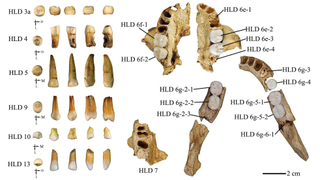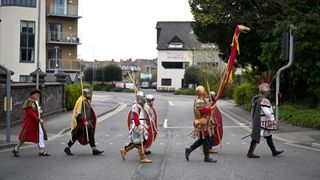
Kristina Killgrove
Kristina Killgrove is a staff writer at Live Science with a focus on archaeology and paleoanthropology news. Her articles have also appeared in venues such as Forbes, Smithsonian, and Mental Floss. Kristina holds a Ph.D. in biological anthropology and an M.A. in classical archaeology from the University of North Carolina, as well as a B.A. in Latin from the University of Virginia, and she was formerly a university professor and researcher. She has received awards from the Society for American Archaeology and the American Anthropological Association for her science writing.
Latest articles by Kristina Killgrove

Skull of bear held captive to fight Roman gladiators discovered near ancient amphitheater in Serbia
By Kristina Killgrove published
Archaeologists determined that the bear had an infected injury and had been held captive for a significant amount of time.

Iconic winged lion statue in Venice may actually be from China's Tang dynasty, study finds
By Kristina Killgrove published
A new study of the trace amounts of lead in Venice's famous winged lion statue suggests that its metal originated in China — and Marco Polo's family may have brought it over.
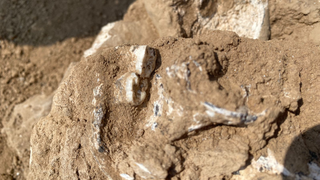
1.8 million-year-old human jawbone discovered in Republic of Georgia — and it may be earliest evidence yet of Homo erectus
By Kristina Killgrove published
A new fossil find in the Republic of Georgia is expanding our understanding of the earliest humans to leave Africa.
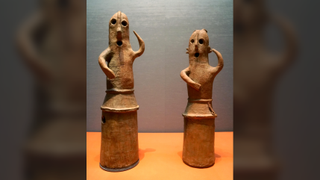
Haniwa Dancers: 1,500-year-old ghostly figurines thought to hold the souls of the dead
By Kristina Killgrove published
Two cylindrical clay sculptures may represent dancers who performed at a funeral 1,500 years ago.
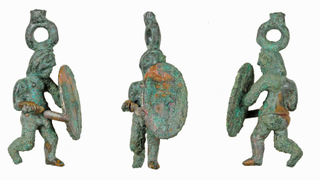
2,200-year-old 'complex and delicate' Celtic warrior charm is evidence of sophisticated metalworking in the Iron Age
By Kristina Killgrove published
Archaeologists discovered a 2,200-year-old bronze warrior charm while excavating an ancient Celtic town in Germany.
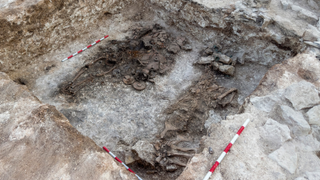
2,100-year-old skeleton of warrior nicknamed 'Lord of Sakar,' buried in a stunning gold wreath, unearthed in Bulgaria
By Kristina Killgrove published
The second century B.C. burial mound is the richest ever found in Bulgaria.
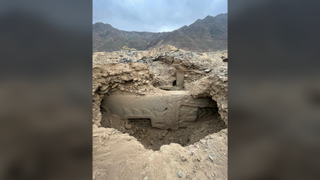
'A truly unprecedented discovery': 3,000-year-old multicolored mural with fish, stars and gods discovered in Peru
By Kristina Killgrove published
A multicolored mural discovered in Peru is shedding light on pre-Inca coastal artistic traditions.
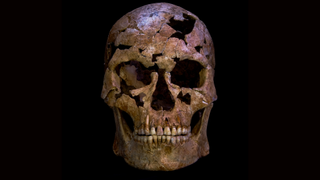
An exotic quartz arrow may have killed a man 12,000 years ago in Vietnam
By Kristina Killgrove published
A man who died 12,000 years ago in Vietnam had a "bonus" rib — and it was broken when he was shot by an exotic arrow.
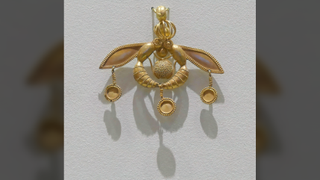
Malia Bee Pendant: A 3,800-year-old accessory found in a Minoan 'pit of gold'
By Kristina Killgrove published
This extremely detailed depiction of insects holds clues to the natural world of the ancient Minoans.
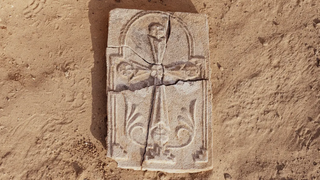
'We never had concrete proof': Archaeologists discover Christian cross in Abu Dhabi, proving 1,400-year-old site was a monastery
By Kristina Killgrove published
The discovery of a Christian cross proves that eighth-century houses found in the United Arab Emirates were part of a monastery.
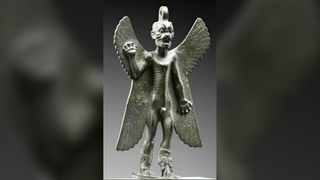
Pazuzu figurine: An ancient statue of the Mesopotamian 'demon' god who inspired 'The Exorcist'
By Kristina Killgrove published
Statues of the Mesopotamian demon Pazuzu are often found at archaeological sites, and his cultural relevance is seen in recent comparisons to creepy-looking Labubu dolls.
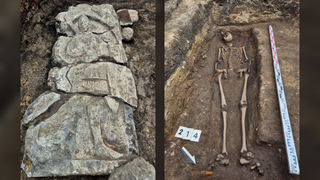
Medieval knight 'Lancelot' and his stunning stone tomb found under ice cream shop in Poland
By Kristina Killgrove published
Archaeologists found the body of a medieval knight underneath a tombstone that depicted him in full military regalia.
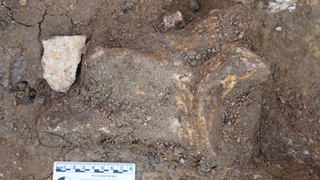
2.6 million-year-old stone tools reveal ancient human relatives were 'forward planning' 600,000 years earlier than thought
By Kristina Killgrove published
Hundreds of stone tools discovered in Kenya have revealed that human relatives traveled long distances to find raw material.
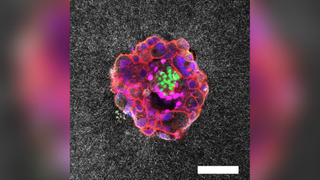
Incredible, first-of-its-kind video shows human embryo implanting in real time
By Kristina Killgrove published
Scientists have captured a video showing the implantation of a human embryo for the first time, using a laboratory model of a uterus.

A braided stream, not a family tree: How new evidence upends our understanding of how humans evolved
By Kristina Killgrove published
Evidence is mounting that the evolution of our species is more convoluted than we imagined — more like a braided stream than a branching tree.
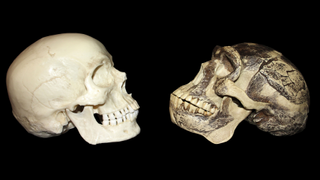
'It makes no sense to say there was only one origin of Homo sapiens': How the evolutionary record of Asia is complicating what we know about our species
By Kristina Killgrove published
As experts study the human fossil record of Asia, many have come to see it as telling a different story than what happened in Europe and Africa.

DNA has an expiration date. But proteins are revealing secrets about our ancient ancestors we never thought possible.
By Kristina Killgrove published
Analysis of ancient proteins may fill in the gaps of human evolution left by the decomposition of DNA.
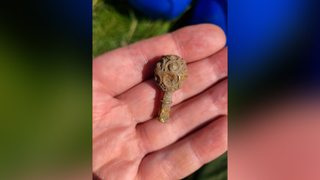
Archaeology student finds rare ninth-century gold 'within the first 90 minutes' of her first excavation
By Kristina Killgrove published
An archaeologist in training discovered a rare medieval gold object in northwestern England during her first excavation.
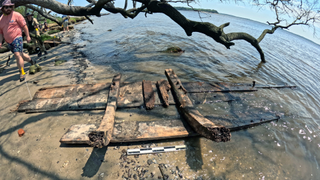
Archaeologists locate 'La Fortuna,' a Spanish ship that exploded in 1748 along North Carolina's coast
By Kristina Killgrove published
Four shipwrecks newly discovered on the North Carolina coast date to colonial times, including one that blew up during an attack.
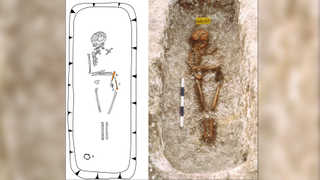
1,300-year-old skeletons found in England had grandparents from sub-Saharan Africa, DNA studies reveal
By Kristina Killgrove published
A DNA analysis of two people who lived in Britain in the seventh century reveals they had recent African ancestry.
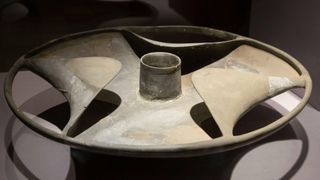
Sabu Disk: A mysterious 5,000-year-old Egyptian stone sculpture that looks like a hubcap
By Kristina Killgrove published
This unique disk-shaped bowl, found in a 5,000-year-old Egyptian tomb, has puzzled archaeologists for nearly a century.
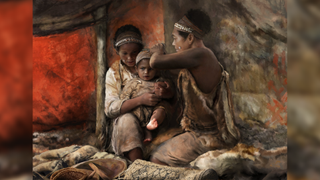
'Oddly shaped head' left in Italian cave 12,500 years ago is Europe's oldest known case of cranial modification, study finds
By Kristina Killgrove published
A Stone Age skull discovered in a cave in Italy is the oldest evidence of artificial cranial modification ever found in Europe.
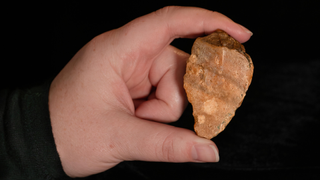
1.5 million-year-old stone tools from mystery human relative discovered in Indonesia — they reached the region before our species even existed
By Kristina Killgrove published
A handful of stone tools found on the Indonesian island of Sulawesi has pushed back the date that human relatives arrived in the region.
Get the world’s most fascinating discoveries delivered straight to your inbox.
